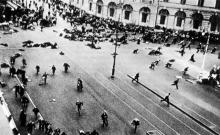In February 1917, Russia’s masses overthrew the Tsarist regime, a byword for everything reactionary and retrograde, and opened the way to the workers’ seizure of power in October of the same year. Today, the revolution has been safely relegated to the history books and TV documentaries, and this is where the ruling classes would like it to stay.
But in reality, the problem posed in 1917 remains the problem of our times. By plunging the world into a war of unimaginable barbarism, the capitalist class demonstrated that its continued rule had nothing to offer humanity but blood and horror. The Russian workers showed the way towards a world wide overthrow of capitalism, and this will be their undying merit.
In 1917 the question was posed: socialism or barbarism? When we look at the world today, who can doubt that this question remains the fundamental one of our times, even if its terms have changed? In this sense, the future still belongs to the Russian revolution.
Today’s proletariat bashes keyboards as much as metal. But it is more than ever an international class, associated in a world wide process of production. The Russian revolution of 1917 belonged to the proletariat of the day. The world revolution to come will be the work of its heirs, the world proletariat of the future.






